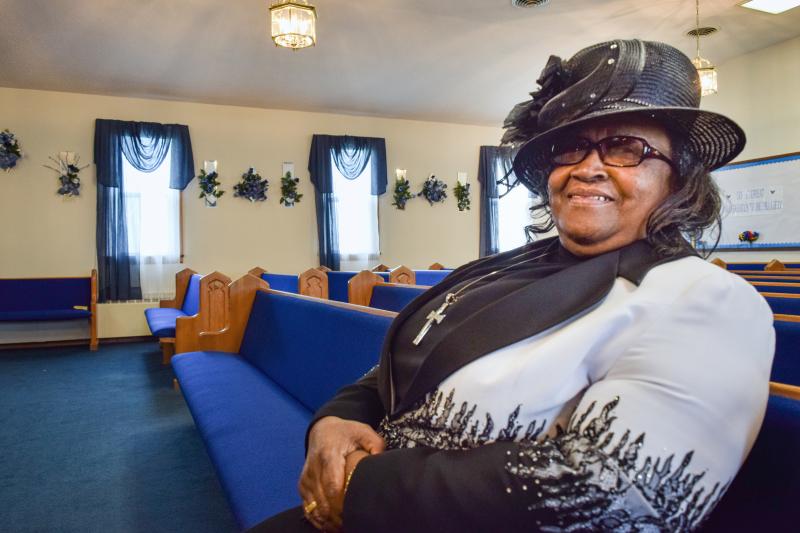Bishop Grace Ruth Batten: Decades of breaking barriers
When Bishop Grace Ruth Batten was a little girl, she didn't exactly dream of becoming a preacher.
Her father, the Rev. Jacob E. Brittingham Sr., already had that covered.
Brittingham founded Mt. Zion Holy Church in Milton, settling down in a town where he and his sons worked side-by-side to build their home and on their family farm off Cave Neck Road.
Sundays – and all days – revolved around church and prayer for the Brittingham family. Mornings would begin with a modest breakfast – oatmeal with some sugar or a bowl of cream of wheat – and Batten would don her Sunday best: Often a blue dress, handmade from cleaned, colored feed bags the family collected from a former feed mill on New Road in Lewes.
Then it was off to Sunday school, followed by a morning service, afternoon sermons and another visit to church in the evening.
"I was always involved with this church," she said. "Being raised in a real Christian home, you felt a call to the ministry."
But it was a very different time back then, she said. Milton was a segregated community in the mid-1900s, and as the youngest of 13 children, Batten quickly learned what she could and couldn't do.
She couldn't go to school with the white children. She couldn't play on their school grounds or participate in their after-school activities. She couldn't sit and eat at the diner in town – it was take-out only for her and her family.
"Those were the days we knew who we were," the mild-mannered pastor said. "Everybody knew their place."
She just didn't know how much things would change over the next half century.
Starting at age 6, Batten attended classes at the one-room Milton Public School 196C (the C indicated it was for people of color) once located on Route 16, learning reading, writing and arithmetic. But it was her parents who taught her how to stay busy, work hard and treat others with respect.
Her father emphasized treating people right and being honest, she said. "They both taught us how to respect each other, how to treat each other, how to talk to each other."
After school she'd come home and change out of her school clothes. "We were not into fashion. It was just a matter of having clothes, so you couldn't afford to keep on your school clothes," she said. Then she'd help with work around the house. Gardening. Feeding the chickens. Raking. Whitewashing.
And life went on. She attended high school, worked a bit, got married, had a son and moved to Virginia.
Circumstance brought Batten back to her southern Delaware roots, where she worked jobs at a sewing factory in Milford and as a punch press operator at National Cash Register Corp. in Millsboro. Between work and raising a son, Batten would go to school, welcoming the call of the ministry with open arms.
She had been hand-picked to take over the pulpit at Mt. Zion, and she had a lot of work ahead before stepping into a role her father once held.
"I didn't choose to be pastor – I was picked," she said. "And in those days, you didn't refuse."
It was the early 1970s, and not all seminaries were open-minded about a woman becoming a pastor. But Batten was determined. So much so that she traveled from Milton to Philadelphia five days a week for two years straight to receive her master's degree in theological studies, making the trek back home just in time for evening services at Mt. Zion.
"There was still some segregation, even in the religious arena," she said. "But if you're going to preach and teach, you need to know what you're talking about."
Years after she finished seminary school and took the lead at Mt. Zion, Batten gave 14 years to the town of Milton as the town's first black council person, and later the first black and first female mayor. That wasn't easy, either, she said.
"You had to have tough skin," she said, admitting that it took some time to gain respect from her all-white, all-male council counterparts.
"It came in small improvements, like when her colleagues decided to stop smoking in the room when she was there.
"I think I helped to break down some barriers here," she said of both her church and her town. "We've come a long way."
At 73, and after 46 years as Mt. Zion's pastor, Batten is still learning. She doesn't wear customized, colored feed bags anymore, though.
She's immaculately dressed, her signature wardrobe item a fashionable hat – she has more than 100 hats from around the world - so many that they need their own room, she said.
"I'd be lost without a hat," she said with a soft laugh.
Sitting at her desk in the now expanded church, course certificates, degrees and other accolades - including a doctorate of sacred theology from the International Christian University - provide a backdrop for a pastor who has always tried to put the needs of her parishioners first.
She's a self-described professional student, currently taking counseling classes from the American Association of Christian Counselors' Light University. And when she's not delivering her church's sermon, she's busy overseeing 16 churches as the Delaware, Maryland D.C. District Bishop, a title she has held since 2011.
"I believe you can help yourself, but you need your education. Knowledge is power," she said.
"Right now, what I want to do is help the churches I'm over. Help them to build their ministry. I still have more work to do."
























































